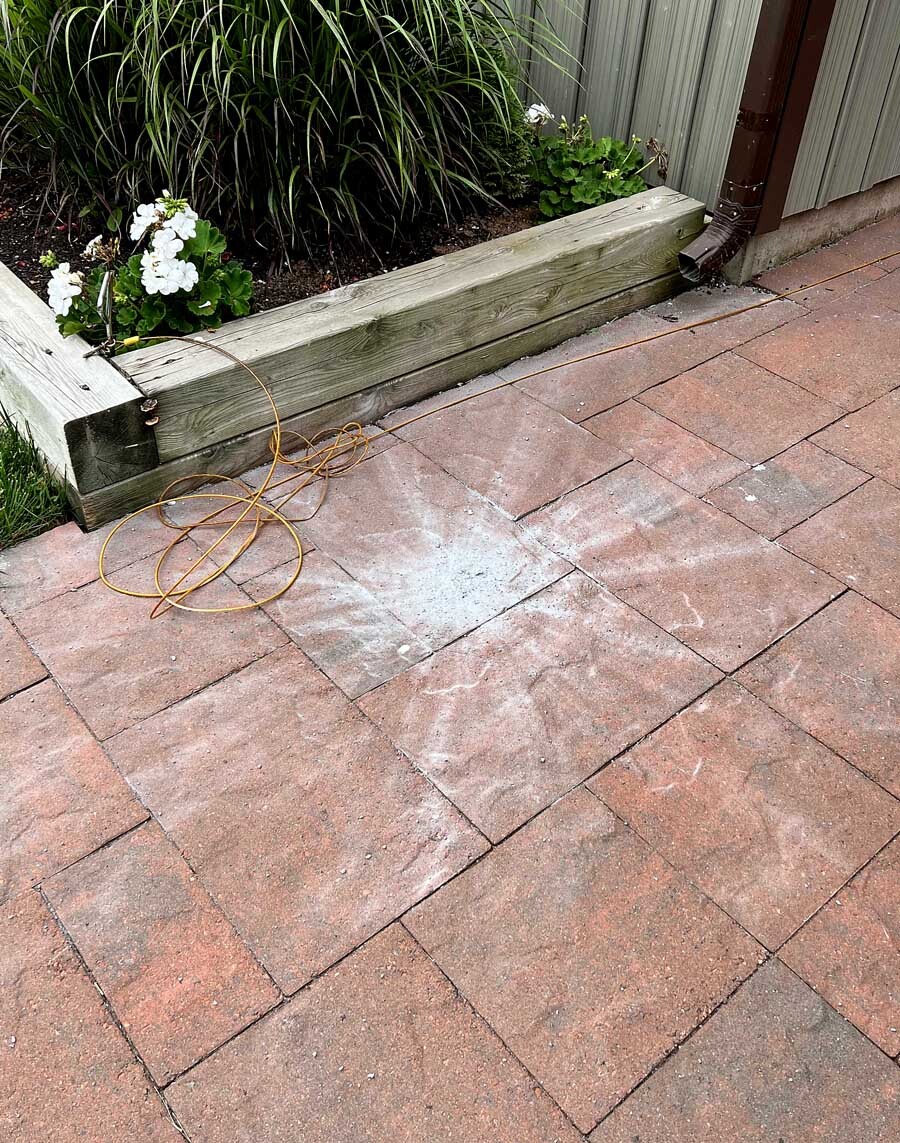24.01.2025
To our best knowledge, the fall of last summer’s Charlottetown meteorite stands as the only audio recording of a meteorite impact.
Every day, some 100 tons of meteoric dust and sand-size particles strike the atmosphere. A smaller but still significant amount of pebble-size meteoroids continually pelts our planet's surface, too. While the increasing use of home security cameras has led to a flood of videos of brilliant fireball trails and flashes in recent years, no one had ever recorded the simultaneous sight and sound of a meteorite impact. That changed on July 25, 2024.

Courtesy of Joe Velaidum and Laura Kelly
That day, Laura Kelly and Joe Velaidum returned to their home after an evening walk in the community of Marshfield, located near Charlottetown on Prince Edward Island (PEI), Canada. On the walkway they noticed something odd — an explosive pattern of gray dust that looked as if someone had taken a friable rock and thrown it with great force against the stone. Not knowing the cause, the homeowners brushed off the rock particles and rinsed the stone clean.

University of Alberta Meteorite Collection
Later, after reviewing footage from their home security camera, they suspected the splat may have been caused by a meteorite impact. They returned to the scene, collected about 7 grams (¼ ounce) of the rocky material with a magnet and vacuum, and then shared the video with the University of Alberta Meteorite Reporting System. They also connected Chris Herd, curator of the University of Alberta Meteorite Collection, and sent him samples of the suspected space rock. Herd confirmed that it was in fact a meteorite.
“As the first and only meteorite from the province of PEI, the Charlottetown Meteorite sure announced its arrival in a spectacular way,” Herd says. “No other meteorite fall has been documented like this, complete with sound. It adds a whole new dimension to the natural history of the island.”

University of Alberta Meteorite Collection
Serendipitously, Herd had planned a trip to the island just 10 days after the meteorite fall, so he made a side trip to visit the couple and document the scene. In the meantime, Velaidum had collected additional fragments and, with Herd's help, found even more, for a total of 95 grams. The couple donated a portion of the precious material to the university for further study and for inclusion in its meteorite collection.
Analysis revealed that the new arrival — since named Charlottetown — was an ordinary chondrite, the most common type of meteorite found on Earth. About 86% of meteorites collected to date belong to this class. Ordinary or not, the sight and (recorded) sound of the new arrival sets it apart from all prior cosmic arrivals.
I'm curious how you would describe the sound? I hear shattered glass. Also, look closely at the video and you'll spot the meteorite prior to impact. It appears in two frames, which I've screenshot and posted here. Notice in the second frame that a small fragment appears to have separated from the main meteorite.

Courtesy of Linda Kelly and Joe Velaidum
You might be wondering why the space rock didn't blast a hole in the ground. First, it was small. By comparing meteorites of the same type and approximate weight from my own collection, I estimate roughly 6-7 centimeters (2-3 inches) across. And although the interplanetary traveler entered the atmosphere at between 44,000 and 145,000 kilometers per hour (27,000 and 90,000 mph), by the time it hit the ground, air resistance had slowed its speed to around 100-200 meters per second (220 to 450 mph). That's still fast but nowhere near cosmic velocity.
Although the Charlottetown meteorite was the first to be recorded in both video and audio, there were two previous sound captures. On April 25, 2023, two surveillance cameras recorded the hissing noise and moment of impact of the German Elmshorn meteorite. Then on September 9, 2023, CCTV captured the sound of a meteorite hitting a table on a witness's property in France.

Bob King
Velaidum was deeply affected by the experience. He related that he had been standing in the spot the meteorite hit just a couple of minutes before the strike. Had he lingered longer before taking the dogs for a walk, he could have easily been struck by the projectile.
"I feel so fortunate to be alive!!" he said. "There are no words to express how I feel about this experience: This meteorite, which has traveled for hundreds of millions of kilometers and somehow, miraculously, misses hitting me by mere minutes as it smashes on our doorstep and is caught on video and, importantly, with sound — for the first time in the history of the Earth. There are no words . . ."
Quelle: Sky&Telescope
